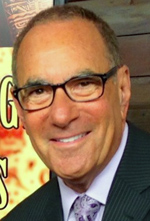By Michael R. Mantell, Ph.D

SAN DIEGO — The other day I was sitting with my group of morning coffee buddies in what we call “Our Caffeinated Corner” — okay, I’ll give the shop an unnecessary plug: Starbucks — and we were talking about health. Everyone had his or her favorite way of obtaining health information, yet turning to the Internet was the most mentioned.
We’re all a well-educated and otherwise uniquely diverse group who communicate about many things, our health status near the top of the list. Our search of the Internet for relevant health information, our understanding what we read and our communicating about it with each other is not unusual, especially for a group of fitness and health conscious Baby Boomers.
In fact, this is consistent with recent Pew research that found that more than 70 percent of internet users say they’ve looked online for health related information. We began wondering where and how others obtain their health information, and how they understand and process what information they acquire.
It’s not a pretty picture. Coupled with the fact that so much health research that’s published today appears to be contradictory, ever-changing and erroneously hyped by screaming, politically influenced headlines, the rest of us everyday “Janes and Joes” are at risk for life-threatening ill-informed behavior when it comes to our health.
Even the most otherwise “literate” individual may not understand complex medical terms that are tossed around by well-meaning medical professionals, may not comprehend risk factor numbers when deciding on one procedure or another, and may be so frightened upon hearing a complicated serious diagnosis, that clarity of thought is non-existent.
I remember visiting a patient in the hospital overhearing an oncologist share the following: “Now, Mr. So and So, we were fortunate to find your pancreatic cancer, and it’s stage four — that’s the highest level.” The patient responded, “Stage four, wow, that’s great! The higher the better, right doc?” Health literacy? Clear communication? It’s not a pretty picture out there.
“Health literacy” is a critically important factor in weighing decisions that carry potentially life-changing implications, yet according to the CDC “today’s health information is presented in ways that are not usable by most adults.” The CDC reports that, based on an earlier study, “nearly 9 out of 10 adults have difficulty using the everyday health information that is routinely available in our health care facilities, retail outlets, media and communities.”
While there does not seem to be a currently accepted single method of finding out just how “health literate” you may be, here are three measures you can learn more about.
1. Rapid Estimate of Adult Literacy in Medicine
The Institute of Medicine suggests that every organization involved in health information needs a “health literacy” plan including for example, leadership who promotes it, a design that meets the needs of all with easy access and effective, clear communication, and that has easy to use materials.
With 50 percent of physicians turning to the Internet, specifically Wikipedia, for information on individual health conditions, many of us also rely on Internet sites including Wikipedia.
But there’s also other top-rated sites we turn to such as MedlinePlus, MayoClinic, WebMD, and HealthCentral, among many others that market to our desire to obtain easy to understand and useful health information.
Without easy access, the ability to understand information, the skill in communicating concerns to raise appropriate questions, to be able to process information wisely, and then to act upon this information, I’m afraid we’re still looking at very limited literacy, causing very high life-altering risky behaviors.
Behavior change is certainly what it’s all about, yet making wise decisions to change lifestyle behavior requires first understanding reliable information.
What are you doing about “health literacy” in your workplace wellness program, your community, your religious institution and with your medical care practitioner? Let’s hope the answer is “a great deal.” Your life and the lives of those around you depend on it.
*
Dr Michael Mantell, based in San Diego, is a Senior Fitness Consultant for Behavioral Sciences, American Council on Exercise, best-selling author and international behavior science presenter and keynote speaker. This article is reprinted from the healthy living section of Huffington Post Mantell may be contacted via michael.mantell@sdjewishworld.com San Diego Jewish World seeks sponsorships to be placed, as this notice is, just below articles that appear on our site. To inquire, call editor Donald H. Harrison at (619) 265-0808 or contact him via donald.harrison@sdjewishworld.com